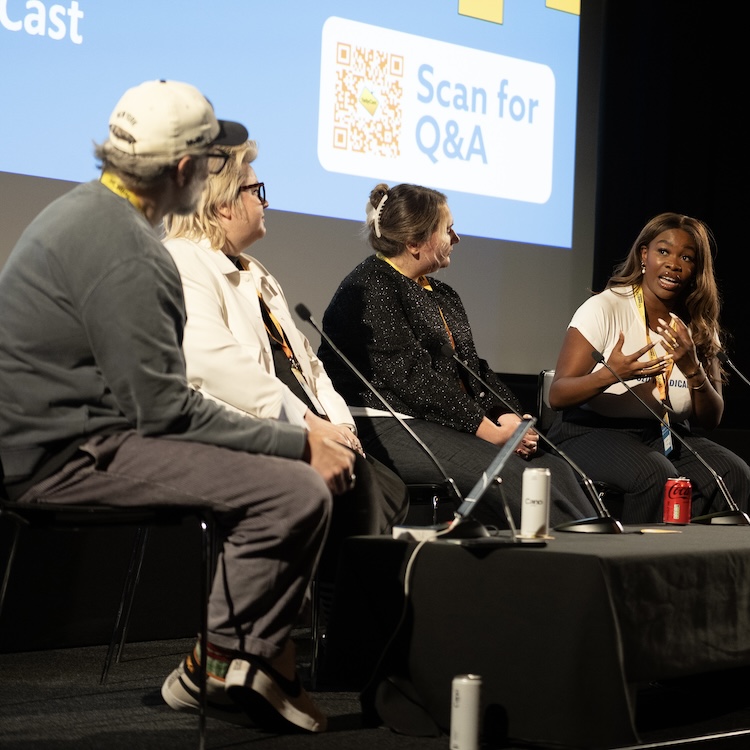The convergence of podcasts and television took centre stage at the TellyCast Digital Content Forum in a spirited discussion featuring Janine Smith, Head of Creative and Culture at Channel 4’s 4Studio, Susie Grant, Head of Visualised Podcasts at Listen, and Jackie Adedeji, broadcaster and creator. The panel, moderated by Daily Mail Group’s Jamie East, examined how podcasts are reshaping the media landscape, providing new formats, forging innovative content ecosystems, and offering an accessible pathway for fresh creative talent.
Janine Smith highlighted Channel 4’s long-standing engagement with podcasts, dating back nearly two decades, and discussed how the format has grown from niche to mainstream. Reflecting on the broadcaster’s work on the Married at First Sight podcast, Smith detailed its evolution from an audio-only series into a fully-fledged companion show that now airs on E4, a move she described as “meeting audiences where they are.”
Smith observed that younger viewers, in particular, prefer platforms such as YouTube over traditional broadcasters’ proprietary streaming services. The podcast’s YouTube iteration has garnered tenfold reach compared with its audio counterpart. She stated, “It is far easier to serve audiences on platforms they are already accustomed to than to try to drive them to new destinations.”
Susie Grant shared insights from her work on the BBC’s Traitors Uncloaked, which capitalised on the seamless integration of television and podcasting. Grant emphasised the importance of tailoring content for specific platforms, from re-editing for audio-only audiences to creating exclusive podcast material. “We super-serve our audiences by ensuring that content fits the format,” she said. The success of Traitors Uncloaked was notable: its finale attracted 4.4 million viewers across BBC Two and iPlayer, while its podcast counterpart brought younger listeners to BBC Sounds in record numbers.
Jackie Adedeji brought a personal perspective, reflecting on her podcast Boob Share, which candidly explores women’s relationships with their bodies. The podcast proved a springboard for her Channel 4 documentaries and exemplifies how the medium allows creators to develop a portfolio and validate ideas. “Podcasting is a fantastic pilot for new ideas,” she explained. “It allows creators to showcase their abilities and build a case for broader storytelling opportunities.”
The panelists explored the evolution of companion content. Historically, glossy spin-off TV shows such as Big Brother’s Bit on the Side dominated the space. Now, however, podcasts are taking their place, offering engaging yet cost-effective alternatives. Smith noted that today’s audiences, particularly younger viewers, are less concerned with elaborate production values and more focused on meaningful and authentic storytelling. “It’s about having conversations that resonate,” she said. “We need to give audiences content in a way that makes sense to them.”
The discussion also delved into the intellectual property (IP) challenges inherent in the podcast-to-TV pipeline. Grant acknowledged the difficulties of retaining exclusive rights once a podcast gains traction, but noted that broadcasters are increasingly viewing podcasts as a testing ground for new IP. She cited Sweet Bobby, a podcast that transitioned to a Netflix drama, as a compelling example of how the medium can incubate powerful stories.
The growing trend of visualised podcasts—programmes that combine traditional audio with video elements—was another key focus. Smith described how these hybrid formats appeal to audiences who consume content across multiple platforms. “YouTube has become a major destination for podcast-based content,” she said. “By integrating video, we are not only broadening the audience but also offering new ways to monetise.”
Adedeji remarked on the unique intimacy of the podcasting medium. “Podcasts feel like you’re talking to a community—a collective of people who are part of something,” she said. “That sense of belonging is incredibly powerful and unlike anything TV has traditionally achieved.”
Looking to the future, the panel agreed that podcasts and television will continue to complement rather than compete with one another. Grant summarised the prevailing sentiment: “It’s not about podcasts replacing TV or vice versa. The beauty lies in how these formats feed into each other, enriching storytelling and audience engagement.”
The overarching message to creators was clear: podcasts offer an unparalleled opportunity for experimentation, innovation, and audience connection. As Smith aptly put it, “Content is content. What matters is delivering what audiences want, wherever they are.”
The discussion underscored a broader trend in modern media consumption. Podcasts are no longer merely an audio medium; they are a powerful and dynamic storytelling platform, now recognised as an integral part of television’s next great evolution.





